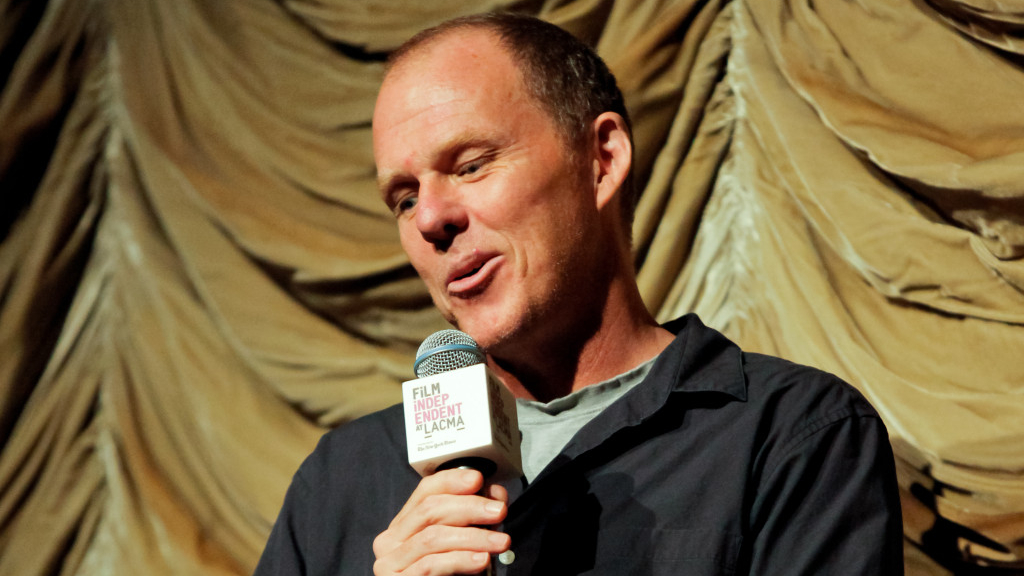It is shocking when someone creates something so integral to popular culture but doesn’t realize it. You know the GIF, you see it almost every day even though you might not realize what movie it’s from. There’s Antonio Banderas rejoicing, but also trying to keeping emotions in check, but he can’t quite do it and he lets himself have a quick moment of glee. You know, this one:

This GIF is from the movie Assassins – Brian Helgeland’s first of two movies with Richard Donner; the second is Conspiracy Theory and we get to that one, too. In Assassins, Banderas thinks he’s just gotten the upper hand on his rival assassin, Robert Rath (Sylvester Stallone), but, spoiler, that’s not how things turn out. Helgeland, who would win an Oscar two years later for his LA Confidential screenplay, wrote that scene and was on set the day that was filmed (and, ahead, takes us through that scene), but had no idea of its place in culture today. (If nothing else comes of my life, at least I got to tell him this has happened.)
Helgeland has been around awhile and has written and directed a lot of movies you probably like (starting with writing A Nightmare on Elm Street 4: The Dream Master), so it’s kind of weird to watch his latest film, Finestkind, which he wrote and directed, and wonder where all this naive optimism comes from. It turns out Helgeland wrote this script about a recent college graduate who just wants to be a fisherman like his brother – which later devolves into heroin smuggling to pay off debts – was written over 30 years ago when Helgeland was in his 20s. He mentions there are plot points he wouldn’t have done today. I mention, well, he’s the director, he could change them. He says no, he wants to respect the writer, speaking of his younger self as if it’s a whole different person. Which, yes, that’s probably true. It’s an extremely interesting exercise in filmmaking. And when Taylor Sheridan is on your side asking if you need more money, well that certainly doesn’t hurt.
I’m an admirer of a lot of your filmography. Even the theatrical version of Payback, which I know you hate…
I don’t hate it. I don’t hate it. I just do the variation.
Well, you have done a masterful job making the theatrical version disappear. If you go try to buy this movie, it’s only your director’s cut version now.
Yeah, I have nothing to do with that, really. I don’t know how that happened. But I think there are rights issues with the theatrical version or something. I don’t know. Everything works out for a reason.
While watching Finestkind, I felt like I do watching your ’90s movies in the sense of, “Wait, what the fuck just happened?” I think that kind of thing used to happen more often with movies.
I mean, I think movies today, they’re so made by committees and they’re so corporate in a way that what those guys don’t realize is the audience is way smarter than they are. And they don’t trust anything. They want everything spelled out. “Why are you the bad guy again? And why are you doing this noble thing?” It’s all spelled out and it’s silly. The audience is so far ahead of studio people that it’s kind of sad.
Have you experienced this in the last few years?
I mean, yeah, always. I’m trying to think of a specific example, but yeah, it’s always a fear of subtlety.
You have an Oscar, so you’d think people would listen to you. When did that change?
I think it started when things were getting consolidated. This is a little before that, but it gives away the idea, is that when Warner became Time Warner and then Time Warner AOL, and then Time Warner Discovery. And movies stopped being their main gig, basically. Movies are now just a part of what we do. And the people in charge weren’t movie people anymore, even studio executives and that kind of thing. But it was the last 15 years ago or so, somewhere in there.
With this one, I’m watching it and I felt like your voice is all over this thing. Did you feel that way and how did you get away with that?
No, I totally felt that way. I mean, the script was written years and years ago. I wrote this script thirty-odd years ago. And so it really has that feel because it’s when I wrote it. And for whatever reason, it never got made. There were different incarnations, but the script is a ’90s script … literally. The joke is the sixty-year-old version of me is directing the twenty-eight-year-old writer version of me. I’m not sure I would’ve done certain things the same.
Well, wait, you’re the director, you still could have changed it.
I kind of respected the writer in a way. I had been a commercial fisherman for a couple of years when I got out of undergraduate school and it was all based on that experience, so I didn’t want to. And I still was very romantic about it. It served it for the character of Charlie, the Toby Wallace character because he’s a young guy who was just going fishing. I didn’t want to cynic it up.
Charlie has this innocence and he’s also kind of naive. It now makes perfect sense you wrote this in your 20s.
And I think if I had rewritten it, it would’ve just felt like an old guy pretending he knows what a young guy thinks. Luckily, I had that version of it still. And that’s why it probably has the ’90s feel because it was written during the ’90s.
Taylor Sheridan is a producer. Does that help getting it made the way you want it made?
Yeah, but 101 produces his stuff, so they’re not the same company. But 101 does all the Yellowstone and all of Taylor’s stuff. So he came on as a producer through them and really did have a lot of respect for me and for my career and stuff. I talked to him a couple of times and he said, “Look, if you don’t have enough money, call me, because I love getting more money.”
Well, that’s a nice thing to hear.
And also he’s a cash cow for Paramount+, who put up some of the money.
Yes, he is.
He never had to flex muscles or anything, but I think the fact that he had them to flex if he wanted to, it was helpful for the budget.
So you didn’t have to make that call?
No, no.
I re-watched Assassins for the first time since the ’90s. I had a great time re-watching that movie. I know at the time when it came out, people weren’t in love with it. But there are a lot of movies from the ’90s that are being reevaluated because they look great, have real stunts, filmed on film…
And plus, Assassins was the first time I worked for Dick Donner…
Right, then you did Conspiracy Theory after with him.
And it was a great learning experience. He had me on the set the whole time, everything’s real. There’s a stunt coordinator. Even Conspiracy Theory, we repelled guys out of helicopters in Union Square in New York. Four helicopters came in at two in the morning and we controlled all that outside the Barnes & Noble bookstore there. And it was like, you could never do that today. It would all be CGI and it would look that way. It’s a weird thing. It’s like people don’t think they need that reality. But especially stunts, it’s like if you ever watch The Road Warrior again, it’s gripping because you don’t have to be consciously thinking it’s real, but you feel it’s real and there’s just no substitute for it.
The thing I wanted to specifically ask about Assassins, do you find it weird that arguably the most popular GIF on the internet is from a movie you wrote?
Which GIF is it?
This one

I know what scene you’re talking about, but I didn’t know that was the most popular GIF.
I see that scene pretty much every day.
I remember when we shot that because we shot it on Lake Union. We built a hotel room for him on Lake Union in Seattle, literally, because Dick wanted to. At the end of the day on Friday he wanted to be able to get on a seaplane and go to his house out in the islands out there. And I remember when we were shooting that stuff with Antonio playing chess. And when he did that, it was so charismatic when Antonio did that, and everyone was like, “Oh my God.” I know “rizz” is the word of the year, but that was. He was just so full of the charisma, or rizz, or whatever you want to call it. I remember him doing that. Just all that kind of “ay-ay-ay” that he could do. It was all over the place.
I’m glad I told you this.
Yeah, I didn’t know.
I just re-watched Conspiracy Theory a few months ago. Here’s what I kept thinking. Mel Gibson’s Jerry Fletcher has all these crazy ideas and it’s just like everyone else in the movie treats him as this one kook. Is it weird for you, having written that movie, back then it’s like, “Look at this one weird guy with these ideas?” Where now 35 percent of the country shares his theories?
Yeah, it’s really strange. It almost is quaint, right?
Yes, that’s exactly the word I was thinking. It’s like back when one person might have some kooky ideas, and now it’s like 35 percent of the country has kooky ideas.
I guess the thing is he’s only publishing his newsletter, which, he has a mimeograph. I forget what he says in the movie, he’s got 8 or 12 subscribers? Of course, all of whom turned up to have been murdered. But now it’s like people have hundreds of millions of subscribers.
Jerry Fletcher was basically the guy who ran QAnon, but back then he had eight people listening to him. Quaint is a good word, but it kind of did predict where things were going.
I always loved conspiracy theories, just because they were so outrageous and fun to think about, but not so much anymore.
Did you ever listen to Art Bell back in the ’90s? It was like, “Hey, there’s a hole in the ground that goes to the center of the earth.” Stuff like that, it did used to be fun.
Now you’d have to make it like Reality Theory or something. Some guy was trying to tell the truth and no one believes him.
You can contact Mike Ryan directly on Twitter.







